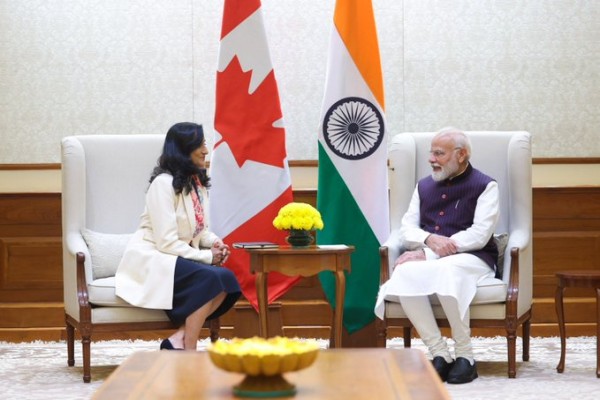
Canadian Foreign Minister Anita Anand, on her first official visit to India since taking office in May, met Prime Minister Narendra Modi and External Affairs Minister S. Jaishankar. The discussions focused on strengthening engagement in trade, energy, agriculture, science and technology, and people-to-people exchanges.
In a statement, the Prime Minister’s Office said Anand’s visit would “contribute to ongoing efforts to impart new momentum to the India–Canada bilateral partnership.” Modi also recalled his meeting with Canadian Prime Minister Mark Carney during the G7 Summit earlier this year and conveyed his best wishes for continued engagement.
Anand posted on X (formerly Twitter) that both countries intend to build on the G7 momentum, maintaining cooperation on law enforcement and expanding economic ties.
Jaishankar and Anand agreed to resume ministerial-level discussions on trade and investment and restart long-dormant platforms such as the Canada–India Ministerial Energy Dialogue and the Joint Science and Technology Cooperation Committee.
Both governments are also encouraging collaboration in digital innovation and emerging technologies. Canadian researchers and AI firms have been invited to participate in India’s upcoming AI Impact Summit in February 2026.
Agriculture was another focus area, with both sides expressing interest in improving food supply chains, developing agri-value chains, promoting the use of agri-waste for energy, and advancing climate-resilient farming practices.
Cooperation in higher education and research—particularly in artificial intelligence, cybersecurity, and fintech—was also emphasised.
The meetings mark a step forward in rebuilding diplomatic engagement more than two years after tensions escalated following allegations by former Canadian Prime Minister Justin Trudeau regarding the killing of Canadian citizen Hardeep Singh Nijjar.
Jaishankar avoided any reference to the 2023 controversy, instead underscoring the need to “restore and reinvigorate mechanisms necessary to advance our partnership.” He cited recent exchanges between National Security Advisers, senior officials, and trade ministers as signs of progress.
“We see a complementary economy, we see another open society, and we believe that is the basis for a close and sustainable framework,” he said.
Both sides are also exploring cooperation in civil nuclear energy and critical minerals.
As members of the G20 and the Commonwealth, India and Canada were noted to share positions on issues such as multilateralism, climate change, and sustainable development. The ministers agreed to maintain regular communication and align efforts at various governmental levels.
With diplomatic representation restored in both capitals, Anand’s visit is expected to sustain a measured process of engagement, signalling steady normalisation without glossing over past differences.
- Huma Siddiquihttps://stratnewsglobal.com/author/huma_siddiqui/
- Huma Siddiquihttps://stratnewsglobal.com/author/huma_siddiqui/
- Huma Siddiquihttps://stratnewsglobal.com/author/huma_siddiqui/
- Huma Siddiquihttps://stratnewsglobal.com/author/huma_siddiqui/




